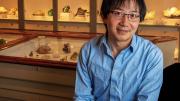In the year and a half between college (at Harvard) and graduate school (at MIT), Roger Fu ’09 lived in an isolated village in the mountains of southern Chile, learning to speak Mapuche with his neighbors and studying indigenous astronomy. People there, he says, understood the stars “based on their role in the night, rather than the physical object”: a star rising at 8 p.m. always carried the same name, even as the earth and heavens rotated. And, he observed, “When you talk about astronomy, everyone’s interested. Understanding what’s in the sky, where everything came from—it’s part of the human need.” For him, too: now Loeb associate professor of the natural sciences in the department of earth and planetary sciences (his undergraduate concentration), Fu studies paleomagnetics, analyzing “the oldest possible rocks”—found in places like northwestern Australia, South Africa, Canada, and Minnesota—to reconstruct magnetic fields from eons ago. In the 1950s, paleomagnetics provided early evidence of plate tectonics, and in a recent study, Fu determined that the continents were in motion at least 3.25 billion years ago, 500 million years earlier than previously thought. He has analyzed Martian meteorites and found that the planet had a strong magnetic field 3.9 billion years ago, which would have supported a thicker atmosphere—and a wetter, more habitable surface. All this research is enabled, Fu says, by the Quantum Diamond Microscope, a magnetometer developed in his lab that can measure tiny samples and identify specific magnetized particles. Describing it, Fu sounds as excited as he was at 11, when he received a telescope for Christmas and stumbled across Jupiter, with its moons and cloud belt, on the first night. He still stargazes for fun—Harvard Forest is a favorite spot—but after having a son last fall, his gaze is more often nearer to home.
Roger Fu
Roger Fu
A paleomagnetics scholar who uses ancient rocks to peer into the early lives of Earth and Mars

Roger Fu
Photograph by Stu Rosner
You might also like
Harvard Faculty of Arts and Sciences Appoints a New Finance Dean
Warren Petrofsky joins at a crucial moment when the FAS is dealing with a $350 million deficit.
Harvard Graduates Can Donate Directly to Their Houses on Housing Day
A new initiative encourages small-dollar donations for improving student life.
A Cap on A’s at Harvard? Students and Faculty Raise Concerns at Town Hall
Dozens debate the grade inflation proposal that faculty will discuss next week.
Most popular
Explore More From Current Issue

A New Landscape Emerges in Allston
The innovative greenery at Harvard’s Science and Engineering Complex

At Harvard’s Beck-Warren House, Ghosts Speak Many Languages
The quirky 1833 home now hosts Celtic scholars.






